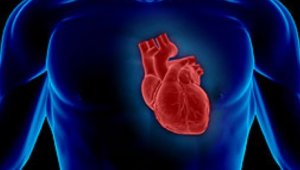
Researchers from Tel Aviv University say the smart tissue will be aware of the heart beat and intervene when it’s not functioning properly, providing regular reports to the patient & cardiologist.
Ilan Gattegno and Israel Hayom Staff
In a significant breakthrough, researchers from Tel Aviv University say they have engineered a bionic heart.

A computerized image of the bionic heart engineered by researchers at Tel Aviv University
The heart, comprised of smart tissue transplanted into patients, will be able to monitor and regulate tissue function. The smart tissue will help the heart beat and intervene when it’s not functioning properly, and provide an exact and regular report to the patient and cardiologist.
Additionally, electronic particles interwoven into the tissue will also know how and when to release anti-inflammatory drugs, all in real time.
The research team, headed by Dr. Tal Dvir, revealed the first tissue of this bionic heart: A cardiac patch, called a “cyborg heart patch,” made of heart muscle cells, biomaterial and nano-composite fibers that allow online monitoring of the engineered-tissue function. The tissue itself is part of a larger system that includes algorithms for managing heart failure.
Heart diseases are the leading cause of death in the West, with heart attacks being most prevalent.
“Statistics show that 50% of those who suffered serious heart attacks will die within five years,” said Dvir. “What we are trying to do is invent alternative tissues to internal organs in general, and to engineer heart tissue specifically.”
The most ambitious development by Dvir and doctoral student Ron Feiner is integrating electronic components into engineered tissue.
“The idea is to monitor heart activity online using nano-electronics, and when necessary regulate the engineered tissue activity — and even to release drugs at the push of a button with the help of special polymers we developed,” said Dvir.
“For example, if the tissue signals that there is an inflammation, we can release an anti-inflammatory drug,” Dvir said. “If the tissue reports a lack of oxygen, we can release biofactors that attract stem cells to build additional blood vessels, all in real time. The patient is sitting at home and doesn’t feel well. The doctor receives a beeper message, logs on and sees the heart’s condition. He decides what to do from afar.”
Dvir and Feiner, of Tel Aviv University’s Biotechnology Department, Materials Science and Engineering Department, and Center for Nanoscience and Nanotechnology, published their findings in the journal Nature Materials on Monday.
Dvir is also examining how his proof of concept could apply to the brain and spinal cord to treat neurological conditions.
“This is a breakthrough, to be sure,” Dvir said. “But I would not suggest binging on cheeseburgers or quitting sports just yet. The practical realization of the technology may take some time. Meanwhile, a healthy lifestyle is still the best way to keep your heart healthy.”
View original Israel Hayom publication at:
http://www.israelhayom.com/site/newsletter_article.php?id=32419








 Israeli New Shekel Exchange Rate
Israeli New Shekel Exchange Rate